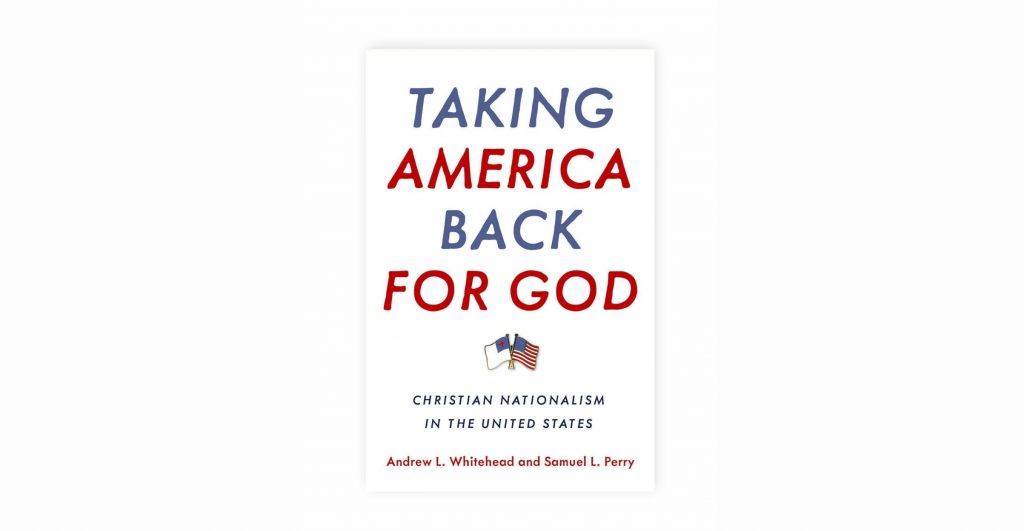Evangelicals like Russell Moore and Beth Moore claim Christian nationalism is more prevalent in American evangelicalism than critical race theory. That claim is becoming one of the most common objections to our concerns about critical race theory’s influence in shaping how many Christians understand racism and justice.
Therefore, though many of us have become familiar with the term “Christian nationalism”, most of us do not know what it means,—nor do we know how prevalent it supposedly is.
Christian nationalism—as it’s defined by many evangelicals today—doesn’t mean what you probably think it means. According to some of its biggest critics, Christian nationalism isn’t merely a corrosive cultural framework held by fringe evangelicals. No, they say Christian nationalism is a destructive cultural framework held by most evangelicals.
Some of the leading critics of Christian nationalism are social scientists Andrew L. Whitehead and Samuel L. Perry. They are some of the authors shaping how some evangelicals think about Christian nationalism—and especially, how prevalent it supposedly is. Last year, they published a book called, Taking America Back for God: Christian Nationalism in the United States.
In their book, they claim evangelicals like Robert Jeffries and Jerry Falwell Jr. are Christian nationalists—unsurprisingly. However, surprisingly, they suggest Francis Schaeffer, Franklin Graham, Wayne Grudem, and apparently, John Piper are also Christian nationalists.
Meaning, according to the book, I am Christian nationalist—and if you’re like most evangelicals: you’re also a Christian nationalist.
Naturally, the book is endorsed by professing Christians like Jemar Tisby. However, the more significant endorsements are from Tim Keller and Christianity Today.
Tim Keller said: “Through careful social science work, Perry and Whitehead identify the force called Christian Nationalism….Many timely and important lessons are here for us.”
Christianity Today’s review of the book said: “I want to congratulate and thank Drs. Andrew Whitehead and Samuel Perry for writing this important book for the moment in which we are living and leading.”
The Christianity Today writer also said:
“Taking America Back for God illustrates just how infected evangelicalism has become with Christian nationalist ideology. Leaders in these circles need to publicly lament and own the ways their tradition has proliferated white supremacy and patriarchy. Until that day, not much will change in these spaces of worship.
In Taking America Back for God: Christian Nationalism in the United States, Andrew L. Whitehead and Samuel L. Perry define Christian nationalism as:
“a cultural framework—a collection of myths, traditions, symbols, narratives, and value systems—that idealizes and advocates a fusion of Christianity with American civic life…it includes assumptions of nativism, white supremacy, patriarchy, and heteronormativity, along with a divine sanction for authoritarian control and militarism. It is as ethnic and political as it is religious.”
Relying on data from Baylor Religion Surveys and their own supposedly ‘in-depth interviews” with 50 Americans—and their observations at four “Christian nationalists” events—the authors describe Americans as either Rejectors, Resisters, Accommodators, or Ambassadors of Christian nationalism.
The authors created the four groups partly based on whether they answered (or would answer) “Strongly Agree—Mostly Agree—Undecided—Mostly Disagree—Strongly Disagree,” on these six questions:
1. The federal government should declare the United States a Christian nation.
2. The federal government should advocate Christian values.
3. The federal government should enforce strict separation of church and state.
4. The federal government should allow the display of religious symbols in public spaces.
5. The federal government should allow prayer in public schools.
6. The success of the United States is part of God’s plan.
Essentially, people who answer “Strongly Agree” to all or most of these questions are Ambassadors of Christian nationalism. People who answer “Mostly Agree” to all or most of these questions are Accommodators. People who answer “Mostly Disagree” to all or most of these questions are Resisters. And people who answer “Strongly Disagree” to all or most of these questions are Rejectors.
Therefore, Rejectors are completely against Christian nationalism, Resisters are mostly against it, Accommodators are mostly supportive of it, and Ambassadors are completely supportive of Christian nationalism.
The authors say 21.5% of Americans are Rejectors, 26.6% are Resisters, 32.1% are Accommodators, and 19.8 are Ambassadors. Their data therefore suggests 51.9% of Americans are either Accommodators or Ambassadors. Meaning, over half of Americans are Christian Nationalists.
More importantly, according to the authors, 78% of evangelicals are either Accommodators or Ambassadors. In other words, most evangelicals are Christian nationalists.
It’s crucial to understand that, especially since they say Christian nationalism plays an essential—yet “unrecognized or misrecognized”—role in supposedly bigoted, intolerant, and polarizing politics in America.
Therefore, according to Andrew L. Whitehead and Samuel L. Perry—most evangelicals play an essential role in “white supremacy, patriarchy, and heteronormativity” in America.
Throughout the book, the authors repeatedly claim they are not condemning Christianity. However, that’s inconsistent with most of what they suggest in the book. It’s difficult to hide bias and deception in a 268 page book. In a sense, Taking America Back for God isn’t a book by social scientists—it’s a book by social justice advocates masquerading as scientists.
Even if we ignore the imprecise and superficial questions from their “in-depth research”—research produced in part by six questions that would elicit similar responses from fringe and mainstream evangelicals for differing theological and political reasons—their first-hand research lacks transparency. They offer strikingly little details about the people they interviewed. Most of the details from their data are from second-hand research by Baylor University, not their own.
Nevertheless, their research isn’t nearly the most concerning thing about the book. Their data is probably reliable. Their information is probably trustworthy—their analysis isn’t.
Though the authors claim otherwise, Taking America Back for God is indeed an anti-Christian book. Particularly, the authors suggest the political implications of Christianity or conservative Christianity is synonymous with Christian nationalism. The authors described Christian nationalist ideology as “the fusion of the Christian religion with conservative politics.”
This is why they say the top four predictors of Christian nationalism are: people who “Identify with political conservatism”, people who “identify as Bible-believing”, people who believe the “Bible is the literal word of God,”and people who believe the “Bible is perfectly true.”
Meaning, most professing Christians are apparently Christian nationalists. Interestingly, since most black Americans are professing Christians—that makes 65% of black Americans Christian nationalists.
That data, however, didn’t receive more than a single sentence of attention—probably because it’s an inconvenient data for their agenda.
That agenda is social justice activism. Throughout the book, the authors consistently abandon impartiality and they fail to conceal their liberal positions.
For instance, since Christian conservatives are complementarian and pro-life people who oppose gay marriage, transgenderism, illegal immigration, and critical race theory—the authors suggest Christian nationalists—including Christian conservatives—are just misogynists, homophobic, transphobic, xenophobic, racists, and white supremacists afraid of losing our power and privilege in society.
For instance, the authors said:
“It is no overstatement to say to suggest that much of the Christian nationalist rhetoric born out of the Religious Right finds its roots in the desire to create boundaries of group membership around race and the right of White Americans to segregate themselves from minorities…Simply put, white conservative Protestants appear to be the most unwilling to recognize police injustice against blacks.”
That explains why some evangelicals believe Christian nationalism is a bigger threat than critical race theory. It’s because Christian nationalism—conservative protestants—are the most unwilling group to accept critical race theory.
There are of course foolish evangelicals like Robert Jeffries who love conservatism more than they love Christ. People like that are ashamed of the gospel, and they should be rebuked.
However, Taking America Back for God suggests most evangelicals—including me and, probably you—are some of the most threatening people in our culture today. And yet, many professing Christians have become so undiscerning and so antagonistic with conservative Christians, they choose to endorse and promote anti-Christian books like this.
Nevertheless, if people like Francis Schaeffer and Wayne Grudem are Christian nationalists, then we need more Christian nationalists in evangelicalism today, not less. Since Christian nationalism is generally another word for a biblical worldview or conservative Christianity—I’m grateful it’s more prevalent than critical race theory is in evangelicalism.
This book review originally appeared at Slow To Write and is republished here with the author’s permission.
Follow Samuel Sey:
-
- Twitter | @SlowToWrite
- Facebook | @SlowToWrite
- Instagram | @SlowToWrite
- Website | www.slowtowrite.com

















